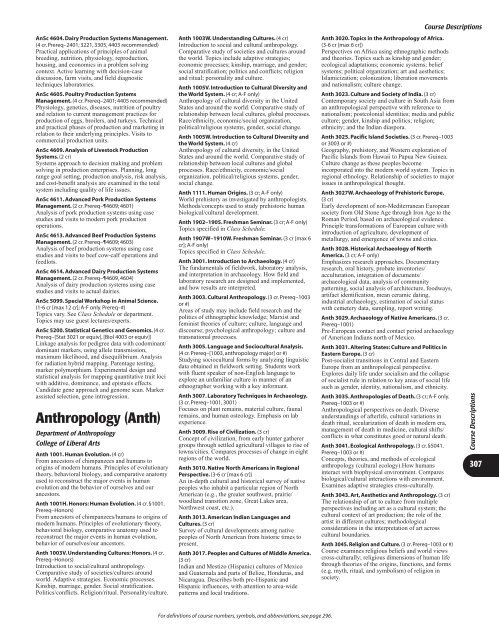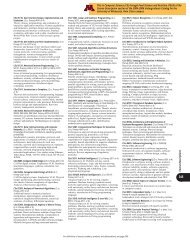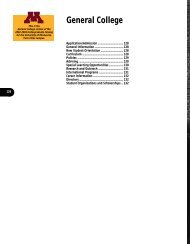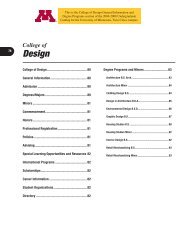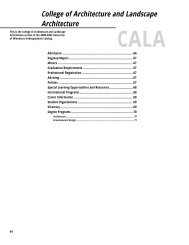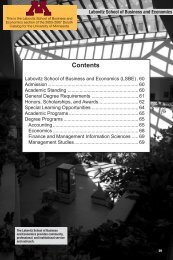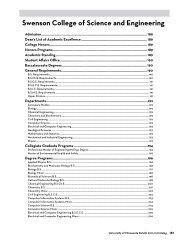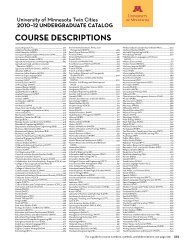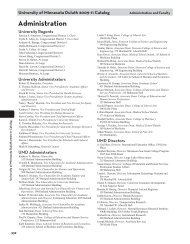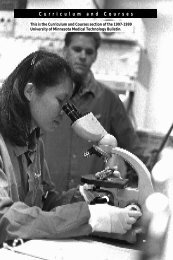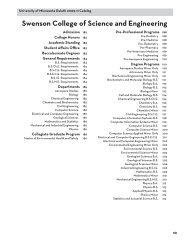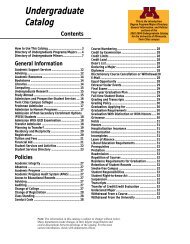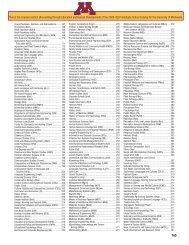CoursesâA through G and course numbers and symbols key
CoursesâA through G and course numbers and symbols key
CoursesâA through G and course numbers and symbols key
- No tags were found...
You also want an ePaper? Increase the reach of your titles
YUMPU automatically turns print PDFs into web optimized ePapers that Google loves.
AnSc 4604. Dairy Production Systems Management.(4 cr. Prereq–2401; 3221, 3305, 4403 recommended)Practical applications of principles of animalbreeding, nutrition, physiology, reproduction,housing, <strong>and</strong> economics in a problem solvingcontext. Active learning with decision-casediscussion, farm visits, <strong>and</strong> field diagnostictechniques laboratories.AnSc 4605. Poultry Production SystemsManagement. (4 cr. Prereq–2401; 4405 recommended)Physiology, genetics, diseases, nutrition of poultry<strong>and</strong> relation to current management practices forproduction of eggs, broilers, <strong>and</strong> tur<strong>key</strong>s. Technical<strong>and</strong> practical phases of production <strong>and</strong> marketing inrelation to their underlying principles. Visits tocommercial production units.AnSc 4609. Analysis of Livestock ProductionSystems. (2 cr)Systems approach to decision making <strong>and</strong> problemsolving in production enterprises. Planning, longrange goal setting, production analysis, risk analysis,<strong>and</strong> cost-benefit analysis are examined in the totalsystem including quality of life issues.AnSc 4611. Advanced Pork Production SystemsManagement. (2 cr. Prereq–4609; 4601)Analysis of pork production systems using casestudies <strong>and</strong> visits to modern pork productionoperations.AnSc 4613. Advanced Beef Production SystemsManagement. (2 cr. Prereq–4609; 4603)Analysis of beef production systems using casestudies <strong>and</strong> visits to beef cow-calf operations <strong>and</strong>feedlots.AnSc 4614. Advanced Dairy Production SystemsManagement. (2 cr. Prereq–4609, 4604)Analysis of dairy production systems using casestudies <strong>and</strong> visits to actual dairies.AnSc 5099. Special Workshop in Animal Science.(1-6 cr [max 12 cr]; A-F only. Prereq–#)Topics vary. See Class Schedule or department.Topics may use guest lectures/experts.AnSc 5200. Statistical Genetics <strong>and</strong> Genomics. (4 cr.Prereq–[Stat 3021 or equiv], [Biol 4003 or equiv])Linkage analysis for pedigree data with codominant/dominant markers, using allele transmission,maximum likelihood, <strong>and</strong> disequilibrium. Analysisfor radiation hybrid mapping. Parentage testing,marker polymorphism. Experimental design <strong>and</strong>statistical analysis for mapping quantitative trait lociwith additive, dominance, <strong>and</strong> epistasis effects.C<strong>and</strong>idate gene approach <strong>and</strong> genome scan. Markerassisted selection, gene introgression.Anthropology (Anth)Department of AnthropologyCollege of Liberal ArtsAnth 1001. Human Evolution. (4 cr)From ancestors of chimpanzees <strong>and</strong> humans toorigins of modern humans. Principles of evolutionarytheory, behavioral biology, <strong>and</strong> comparative anatomyused to reconstruct the major events in humanevolution <strong>and</strong> the behavior of ourselves <strong>and</strong> ourancestors.Anth 1001H. Honors: Human Evolution. (4 cr. §1001.Prereq–Honors)From ancestors of chimpanzees/humans to origins ofmodern humans. Principles of evolutionary theory,behavioral biology, comparative anatomy used toreconstruct the major events in human evolution,behavior of ourselves/our ancestors.Anth 1003V. Underst<strong>and</strong>ing Cultures: Honors. (4 cr.Prereq–Honors)Introduction to social/cultural anthropology.Comparative study of societies/cultures aroundworld. Adaptive strategies. Economic processes.Kinship, marriage, gender. Social stratification.Politics/conflicts. Religion/ritual. Personality/culture.Anth 1003W. Underst<strong>and</strong>ing Cultures. (4 cr)Introduction to social <strong>and</strong> cultural anthropology.Comparative study of societies <strong>and</strong> cultures aroundthe world. Topics include adaptive strategies;economic processes; kinship, marriage, <strong>and</strong> gender;social stratification; politics <strong>and</strong> conflicts; religion<strong>and</strong> ritual; personality <strong>and</strong> culture.Anth 1005V. Introduction to Cultural Diversity <strong>and</strong>the World System. (4 cr; A-F only)Anthropology of cultural diversity in the UnitedStates <strong>and</strong> around the world. Comparative study ofrelationship between local cultures, global processes.Race/ethnicity, economic/social organization,political/religious systems, gender, social change.Anth 1005W. Introduction to Cultural Diversity <strong>and</strong>the World System. (4 cr)Anthropology of cultural diversity, in the UnitedStates <strong>and</strong> around the world. Comparative study ofrelationship between local cultures <strong>and</strong> globalprocesses. Race/ethnicity, economic/socialorganization, political/religious systems, gender,social change.Anth 1111. Human Origins. (3 cr; A-F only)World prehistory as investigated by anthropologists.Methods/concepts used to study prehistoric humanbiological/cultural development.Anth 1902–1905. Freshman Seminar. (3 cr; A-F only)Topics specified in Class Schedule.Anth 1907W–1910W. Freshman Seminar. (3 cr [max 6cr]; A-F only)Topics specified in Class Schedule.Anth 3001. Introduction to Archaeology. (4 cr)The fundamentals of fieldwork, laboratory analysis,<strong>and</strong> interpretation in archaeology. How field <strong>and</strong>laboratory research are designed <strong>and</strong> implemented,<strong>and</strong> how results are interpreted.Anth 3003. Cultural Anthropology. (3 cr. Prereq–1003or #)Areas of study may include field research <strong>and</strong> thepolitics of ethnographic knowledge; Marxist <strong>and</strong>feminist theories of culture; culture, language <strong>and</strong>dis<strong>course</strong>; psychological anthropology; culture <strong>and</strong>transnational processes.Anth 3005. Language <strong>and</strong> Sociocultural Analysis.(4 cr. Prereq–[1003, anthropology major] or #)Studying sociocultural forms by analyzing linguisticdata obtained in fieldwork setting. Students workwith fluent speaker of non-English language toexplore an unfamiliar culture in manner of anethnographer working with a <strong>key</strong> informant.Anth 3007. Laboratory Techniques in Archaeology.(3 cr. Prereq–1001, 3001)Focuses on plant remains, material culture, faunalremains, <strong>and</strong> human osteology. Emphasis on labexperience.Anth 3009. Rise of Civilization. (3 cr)Concept of civilization, from early hunter gatherergroups <strong>through</strong> settled agricultural villages to rise oftowns/cities. Compares processes of change in eightregions of the world.Anth 3010. Native North Americans in RegionalPerspective. (3-6 cr [max 6 cr])An in-depth cultural <strong>and</strong> historical survey of nativepeoples who inhabit a particular region of NorthAmerican (e.g., the greater southwest, prairie/woodl<strong>and</strong> transition zone, Great Lakes area,Northwest coast, etc.).Anth 3013. American Indian Languages <strong>and</strong>Cultures. (3 cr)Survey of cultural developments among nativepeoples of North American from historic times topresent.Anth 3017. Peoples <strong>and</strong> Cultures of Middle America.(3 cr)Indian <strong>and</strong> Mestizo (Hispanic) cultures of Mexico<strong>and</strong> Guatemala <strong>and</strong> parts of Belize, Honduras, <strong>and</strong>Nicaragua. Describes both pre-Hispanic <strong>and</strong>Hispanic influences, with attention to area-widepatterns <strong>and</strong> local traditions.Course DescriptionsAnth 3020. Topics in the Anthropology of Africa.(3-6 cr [max 6 cr])Perspectives on Africa using ethnographic methods<strong>and</strong> theories. Topics such as kinship <strong>and</strong> gender;ecological adaptations; economic systems; beliefsystems; political organization; art <strong>and</strong> aesthetics;Islamicization; colonization; liberation movements<strong>and</strong> nationalism; culture change.Anth 3023. Culture <strong>and</strong> Society of India. (3 cr)Contemporary society <strong>and</strong> culture in South Asia froman anthropological perspective with reference tonationalism; postcolonial identities; media <strong>and</strong> publicculture; gender, kinship <strong>and</strong> politics; religion;ethnicity; <strong>and</strong> the Indian diaspora.Anth 3025. Pacific Isl<strong>and</strong> Societies. (3 cr. Prereq–1003or 3003 or #)Geography, prehistory, <strong>and</strong> Western exploration ofPacific Isl<strong>and</strong>s from Hawaii to Papua New Guinea.Culture change as these peoples becomeincorporated into the modern world system. Topics inregional ethnology. Relationship of societies to majorissues in anthropological thought.Anth 3027W. Archaeology of Prehistoric Europe.(3 cr)Early development of non-Mediterranean Europeansociety from Old Stone Age <strong>through</strong> Iron Age to theRoman Period, based on archaeological evidence.Principle transformations of European culture withintroduction of agriculture, development ofmetallurgy, <strong>and</strong> emergence of towns <strong>and</strong> cities.Anth 3028. Historical Archaeology of NorthAmerica. (3 cr; A-F only)Emphasizes research approaches. Documentaryresearch, oral history, probate inventories/acculturation, integration of documents/archaeological data, analysis of communitypatterning, social analysis of architecture, foodways,artifact identification, mean ceramic dating,industrial archaeology, estimation of social statuswith cemetery data, sampling, report writing.Anth 3029. Archaeology of Native Americans. (3 cr.Prereq–1001)Pre-European contact <strong>and</strong> contact period archaeologyof American Indians north of Mexico.Anth 3031. Altering States: Culture <strong>and</strong> Politics inEastern Europe. (3 cr)Post-socialist transitions in Central <strong>and</strong> EasternEurope from an anthropological perspective.Explores daily life under socialism <strong>and</strong> the collapseof socialist rule in relation to <strong>key</strong> areas of social lifesuch as gender, identity, nationalism, <strong>and</strong> ethnicity.Anth 3035. Anthropologies of Death. (3 cr; A-F only.Prereq–1003 or #)Anthropological perspectives on death. Diverseunderst<strong>and</strong>ings of afterlife, cultural variations indeath ritual, secularization of death in modern era,management of death in medicine, cultural shifts/conflicts in what constitutes good or natural death.Anth 3041. Ecological Anthropology. (3 cr. §5041.Prereq–1003 or #)Concepts, theories, <strong>and</strong> methods of ecologicalanthropology (cultural ecology).How humansinteract with biophysical environment. Comparesbiological/cultural interactions with environment.Examines adaptive strategies cross-culturally.Anth 3043. Art, Aesthetics <strong>and</strong> Anthropology. (3 cr)The relationship of art to culture from multipleperspectives including art as a cultural system; thecultural context of art production; the role of theartist in different cultures; methodologicalconsiderations in the interpretation of art acrosscultural boundaries.Anth 3045. Religion <strong>and</strong> Culture. (3 cr. Prereq–1003 or #)Course examines religious beliefs <strong>and</strong> world viewscross-culturally; religious dimensions of human life<strong>through</strong> theories of the origins, functions, <strong>and</strong> forms(e.g. myth, ritual, <strong>and</strong> symbolism) of religion insociety.Course Descriptions307For definitions of <strong>course</strong> <strong>numbers</strong>, <strong>symbols</strong>, <strong>and</strong> abbreviations, see page 296.


